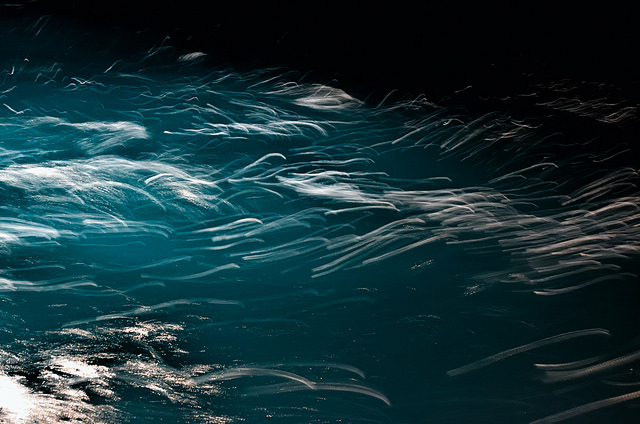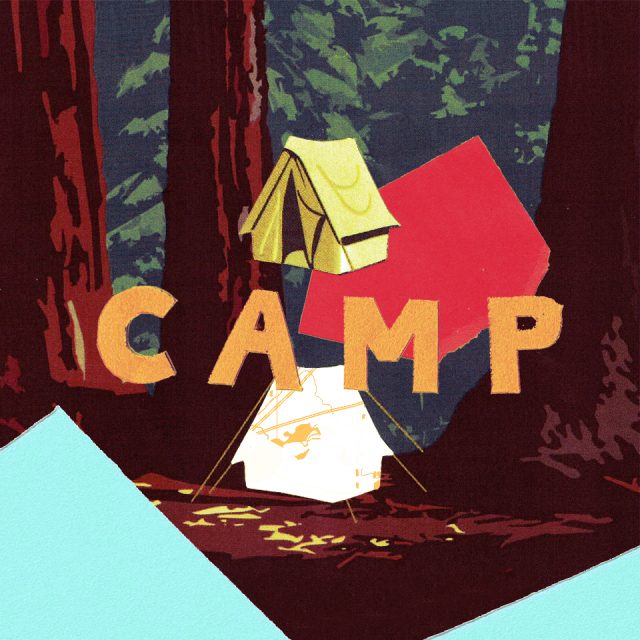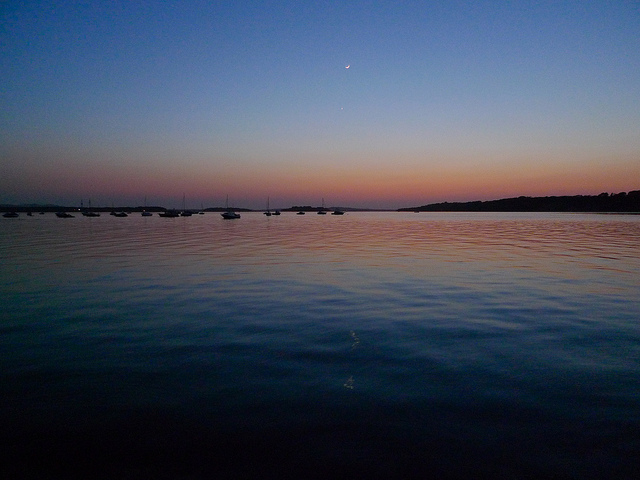The dreams only start after camp, after I take my first swim with Appah. I watch him with binoculars as he moves farther and farther out into the deep.

I dream I live in a house. The house is small and red, and it’s propped up on wheels, like an office chair. The house stands on a cliff, facing the ocean. A strong gust of wind rolls the house over the edge and into the water. I watch as it bobs up and down like a buoy, then begins to fill with the sea. Down below, there is a man who sits on a raft. I know that this man’s job is to toss my house back to me. I raise my arm to signal to him, and he floats over to the house, grabs it by the bottom, and throws it easily over his head. It flies back to me in a perfect arc, landing neatly on the cliff. I set to work picking jellyfish from my dresser with chopsticks, holding them a full arms-length away, like I’ve developed a specific technique, like I’ve been doing this for years. I chase three crabs, scampering with their claws raised, out the front door. When the house is free of sea life, I’m too tired to remove its wheels.
*
Appah always tells me and Ammah that the only way to get over a fear is to learn everything there is to know about whatever makes you afraid.
“If you know about it, you can plan for the worst case scenario.”
I try to think of something clever to say in response, something that will convince Ammah and Appah that I should go to tennis camp instead of sea camp. I can’t, and instead I land on, “I already know how to swim, I just only like the pool.”
Ammah sighs, and I know that it’s Appah and not Ammah who signed me up. Still, she tells me to stop being stubborn as she signs the permission slip that’s been out on the counter for a few days now.
“You wouldn’t want to go either, Ammah.”
“You’ll learn so much, I promise,” says Appah, looking to Ammah for support.
“Mrs. Miller signed Alyssa up, too,” Ammah adds, trying to make me feel better. I haven’t been friends with Alyssa since fourth grade, but I don’t tell her that.
*
We’ve lived in Florida my whole life, but I’ve never loved the beach like Appah does. He likes to tell me about piling into the car with his cousins for long days at Casuarina Beach. He says he was the bravest of them all—the others afraid of the waves, most of them unable to swim. I only half listen to these tales, as I’ve never met the other characters in his Sri Lanka stories, the stories from before he moved to New Jersey as an eighteen-year-old. I almost don’t believe Appah was ever a kid because I’ve never met anyone who knew him as one.
When I was nine, we went to the science museum to see an IMAX movie about the deep sea. Appah said that maybe it would make me and Ammah appreciate all the beauty the ocean has to offer. The movie showed a tiny submarine sinking deeper and deeper, down to where the sun can’t touch, down to where the animals use light to attract their prey.
For a few months after, if I tried to wade into the water, I was sure that I would step on something, maybe a shell or a barnacle or whatever else lies beneath the surface, and I would get a big cut on the bottom of my foot. Then, a giant fish, like one in the IMAX movie, would smell my blood from the depths of the ocean.
*
I’m in a group with all the other kids going into seventh grade. Our counselor’s name is Caitlyn. She has brown hair that’s a little blonde at the tips, and her tan lines form a perfect “X” in the middle of her back. She studies marine science at Florida Gulf Coast, and she tells us about what she researches, but I’ve already zoned out thinking about the icebreaker.
That first day, she makes us take a swim test in the pool. I feel myself relax a little—no ocean swimming today.
I tighten the straps of my goggles around my face until my cheeks feel like they’re going to slide off. I try to do that dive where you put your hands above your head, clasped together like you’re praying, and you just plop forward into the water. I always try that dive, but I can’t do it.
Instead, my knees hit the water first, and I fall in with my hands stretched out in front of me. The water is surprisingly cold for a Florida summer day, and I tread in my lane while the boy in front of me takes his turn. There is a high school group at the other end of the pool, doing tricks off the diving board. One boy tries a backflip and lands flat on his stomach. I can hear skin slap water. His chest is raw red when he climbs up the ladder.
Caitlyn calls my name to start, and I do two laps as fast as I can even though it’s not timed. I pass the swim test, pull myself out at the edge, and dangle both my feet into the still, clear water.
*
Three years ago, a tsunami hit Sri Lanka. We watched the news as a family, surrounded in the living room by unwrapped Christmas presents, and I saw shaky videos of towns being wiped out entirely. It didn’t hit the city where Ammah and Appah grew up, Jaffna, but they still came to my school to talk about it. My teacher introduced Appah as my father, and even though everyone in the school already knew, Appah pointed to me in the auditorium and said, “There she is.” I wished I had chosen a different t-shirt that day.
Appah explained the science behind what happened, throwing in words like “seismic” and “tectonic.” There was an earthquake, and the movement beneath the ground caused a shift in the sea. He listed off how many people died and the names of the towns and cities that were affected most, and a girl in my class asked him in a worried tone about the tectonic plates around Florida—could they shift too? Could we be hit? He softened then, reassuring us that we’re fine, that it’s highly unlikely. When my teacher prompted her, Ammah explained how my classmates and their families could help. They had questions about what it’s like to live in Sri Lanka, and Ammah told them it isn’t so different from Florida, full of palm trees and beaches. I think there must be more to it than that.
Ammah was smiley during the presentation, full of optimism, but later that evening I saw her cry a little when she talked about the tsunami on the phone.
“They’ve already been through so much,” she said. “What more can they handle?”
I’m not sure who was on the other end of the call.
*
After the tsunami, Ammah wouldn’t even touch the water when we went to the beach. Appah said she was being irrational, but I didn’t think so.
“It’s all the same water,” she argued when he pressed her on the heightened fear. “The same water that built up like a wall. The same water that devastated.”
She didn’t want to splash around in it, even if the wall came down.
*
On the second day, Caitlyn has us put together an old manatee skeleton. I’ve never seen a manatee in the wild, but they’re on Ammah’s license plate. Caitlyn shows us a diagram, and we get down on our hands and knees at the big pavilion near the water and surround the vertebrae in a circle, the other bones piled to the side like building blocks. It’s my job to connect the ribs to the spine, snapping together small attached clasps. As I rub my fingers over the length of a rib, I realize that there are parts that are filled in with plastic instead of bone.
Caitlyn holds a piece of laminated paper that she reads from, telling us about this manatee as we rebuild it.
“Her name was Dotty, and she was pregnant when she died.”
“What happened to her baby?”
“The baby must have died too.”
“Is the other group putting together its bones?”
They’re not.
Dotty was killed by a boat—she got stuck in the propellers.
“That’s why it’s important to read signs about boat speeds in places where there could be a manatee.”
We finish the skeleton, and Caitlyn says we can walk down to the beach for a while. We aren’t allowed in the water right now, but two of the campers in my group want to lay out and tan. I slather on sunscreen until my skin becomes that almost-purple of midsummer.
*
Sometimes Appah is in my dreams. We wave to the man down below, but he doesn’t wave back. He’s too busy ducking in and out of the waves to look up. After a while, Appah smiles at me, holds his hands over his head, and dives to join the man. They motion to me to jump in, too. I want to go after Appah, to meet the man, but I tell myself that someone has to stay with the house.
*
At the end of the first week, we go snorkeling.
There’s another guide who helps Caitlyn load us into the boat. She has a megaphone and a whistle, and her red visor makes me feel like I can trust her.
“Find a buddy you can stay with in the reef!”
I pair up with my new friend Briana.
“I’ve been snorkeling with my family a bunch of times,” she tells me. “Both my brothers are scuba certified, too. Last time we snorkeled, I saw a turtle.” I’m not sure how rare turtles are, but I respond with the appropriate, “No way!”
We collect our flippers and our goggles. I put my flippers on too early and have to lift my legs up really high to walk without dragging them, nearly tripping as I climb onto the boat. We sit in rows, on seats draped with blue towels, facing backwards towards the motor. As we travel away from shore, I watch the wake build and disappear behind us.
The guide teaches us how to breathe with the snorkel, in and out through our mouths, keeping the tube upright pointed to the sky so we don’t inhale saltwater. Caitlyn says that on the boat trip back we’re going to make a list of all the sea creatures we see underwater. I make a goal to have at least one animal to contribute. We aren’t allowed to stand up in the water, even if it’s shallow. We should instead float, flippers and legs horizontal to the sand below, as close to the surface as we can get. Standing, she tells us, will destroy the reef.
I jump into the lukewarm water from the ladder. My life jacket is too big on me, and it keeps riding up and scratching against my chin. I try to stay horizontal so my flippers don’t touch the bottom, but sometimes my legs move instinctually to the standing position. I say sorry in my head to all the coral I kill. Briana leads us, paddling farther from the boat than I want to. She points at a school of fish that passes just below us. I kind of like the way the snorkel hugs my gums. Still, for most of the forty-five minutes we’re off the boat, I take out my snorkel and turn over onto my back, floating while Briana swims around me. She surfaces every few minutes to report a new animal sighting.
“Hey look, a big yellow one!”
“And I saw some kind of eel maybe?”
We scramble back onto the boat at the sound of the whistle. Jeremy says he saw a shark, but no one believes him.
*
One of Appah’s favorite stories is about a man who swam across the Palk Strait between India and Sri Lanka. It took him over twenty-four hours. Appah was a little kid at the time, but he says his Appah read the story to him from the paper the next morning. It became Appah’s goal to do the same thing, but he never got the chance. Even though he’s disappointed, I’ve always been glad that he didn’t: the strait is known to be filled with sandbars and sharks.
*
We learn the stingray shuffle on dry land first. Caitlyn plays the Beach Boys and we treat it like it’s just a dance, but it’s not. It’s a way to move your feet through the sand so you don’t go to the hospital with a stingray’s barb in your foot.
*
I applied to a private middle school last year. Part of the application was a 500-word essay. I wrote about how our family helped with tsunami relief, sending money and supplies from Fort Meyers to Batticaloa, on the eastern coast of Sri Lanka. When we got to tour the school, they took us around on a golf cart to see the different buildings. I had to interview with one of the admissions people, and she told me that my essay was very moving. She pronounced Sri Lanka like “Tree Lank-uh,” but “lank” like in the word “lanky.” She said she cried when she read it, but she smiled when she told me that.
“All those poor people. A shame.”
*
By week two, I don’t mind the shallows so much. I wade in up to my shoulders, always sure to look down at my feet in case any mysterious gray blobs appear below. My favorite is boogie boarding, being pushed back to shore instead of pulled out to sea. I think maybe one day I’ll put on a wetsuit and move to California and surf for real.
On that Friday, we’re called into the lunch hall in the morning. Someone spreads a rumor that maybe the counselors are throwing us a party because we had no food waste at Thursday’s lunch. The lunch tables are pushed to the sides, and we sit in the middle of the room on the floor. I imagine what the party would be like. Maybe we’d put on the Beach Boys and dance the stingray shuffle again, this time with more hips. The camp director stands up with a microphone. Her khaki shorts make her look like a student at my private school, but I guess that she’s about Ammah’s age.
She looks down and tells us quietly that there was an accident the day before. A group of high school campers swam farther out than we’re supposed to, past the buoy. There was a strong riptide like the ones that we’ve been warned about all our lives—the ones we aren’t supposed to fight if they catch us. One girl was pulled out into the ocean, so far that you could barely see her from shore. The lifeguard was able to get her back to the beach, but by the time they returned, the girl had swallowed too much saltwater. She’s in the hospital now.
Some of the high school campers are crying. The counselors are huddled together, gossiping about the one staff member who was supposed to be with the girl’s group.
“Is he fired?”
We sit in the hall for the rest of that morning, listening to the counselors lecture us about riptide safety as they point to posters labeled “Break the Grip of the Rip!”
*
When I tell Ammah about the girl, she tells me three separate stories about people who drowned when she was growing up, who waded too far or were swept up too quickly. There were no lifeguards, no swim lessons, no camp counselors. I feel lucky, in a way—the high schooler was fine after a week, and I saw her back on the last day of camp, getting ready to go kayaking with her group through the mangroves. Ammah’s ocean sounds scarier than mine.
*
After sea camp ends, Ammah, Appah, and I go to the state park for a beach day, complete with hot dogs and pool noodles. Before we get in the water, Appah and I review what I should do if I feel myself drifting with a strong current.
“Don’t struggle, swim parallel to shore, signal for help,” I list. He’s right: the repetition dulls my fear.
Appah swims far out, but he doesn’t get taken away. I check the lifeguard’s flags, and I only go out with Appah in the afternoon when the flag is green—I wait for ideal conditions.
My heart still races when I first enter the water, but I don’t mind as much when Appah is swimming a few feet beside me. I try to convince Ammah to come with us, but she won’t, content to stay under our umbrella in the sand.
“Don’t push her,” Appah tells me, and I don’t.
Once Appah and I return to shore, we all go for a walk, and Ammah almost steps on what she thinks is a jellyfish.
“Actually, it’s a Portuguese man o’ war,” I tell her, flaunting my sea camp knowledge.
“I didn’t know those made it to Florida, too. Sri Lanka used to be full of them,” she says with a sarcastic smile. Appah laughs.
*
The dreams only start after camp, after I take my first swim with Appah. With time, the dreams begin to shift, and I notice that the man on the raft has paddled far out to sea. He’s no longer there to throw my house back to me. Briefly, I think about finally taking the wheels off now that I’ve lost this safety net. I watch him with binoculars as he moves farther and farther out into the deep. He takes a straw from a sack he keeps on the raft, and he swallows up part of the ocean. Extending from the straw, I can see a sliver that connects to the shore, water rushing directly into his mouth. He stops swallowing, but this strip of the ocean keeps flowing towards him. He then takes his paddles and pushes against the waves rhythmically. He creates a rough patch of sea around him, which ripples outward until the sea builds up more and more. I can’t see him past the waves.



